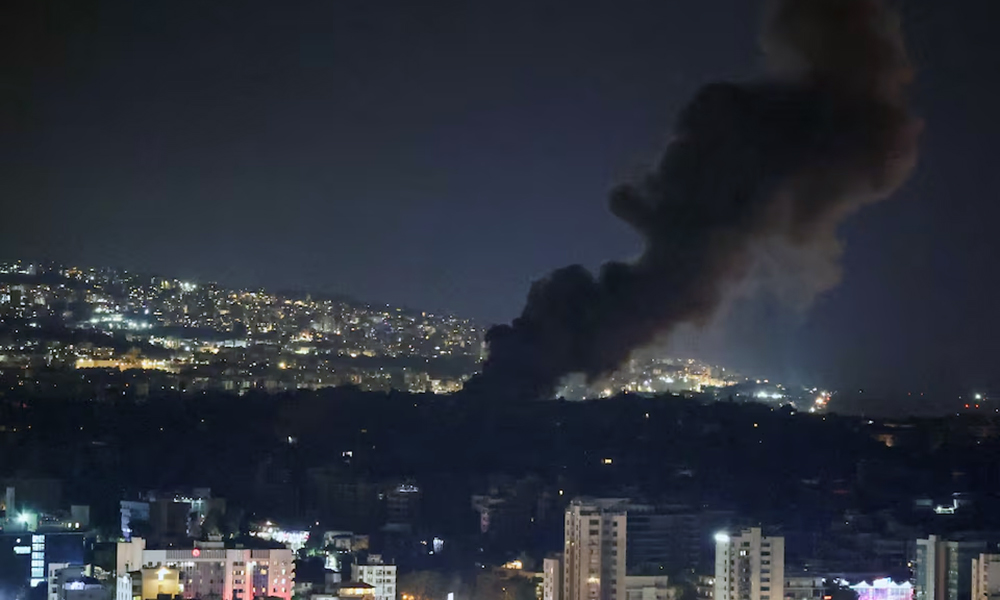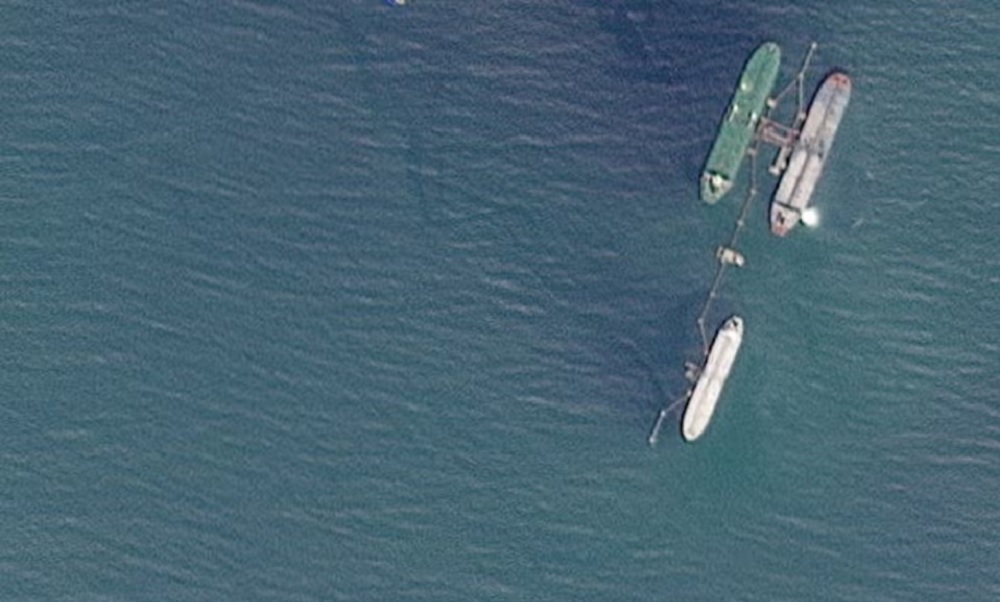World
Israel begins Lebanon ground invasion with ‘limited’ raids on Hezbollah
Hezbollah’s deputy leader Naim Qassem, in a first public speech on Monday since Nasrallah’s death, said that “the resistance forces are ready for a ground engagement.”

Israel’s widely expected ground invasion of Lebanon appeared to be getting underway early on Tuesday as its military said troops had begun “limited” raids against Hezbollah targets in the border area, Reuters reported.
The military said in a statement that it had begun “limited, localised, and targeted ground raids based on precise intelligence” against Hezbollah in southern Lebanon villages close to the border that posed “an immediate threat to Israeli communities in northern Israel”.
It said the air force and artillery were supporting the ground forces with “precise strikes.”
Local residents in the Lebanese border town of Aita al-Shaab reported heavy shelling and the sound of helicopters and drones overhead. Flares were repeatedly launched over the Lebanese border town of Rmeish, lighting up the night sky.
On Monday, Israeli Defence Minister Yoav Gallant had told local council heads in northern Israel that the next phase of the war along Lebanon’s southern border would begin soon, and would support the aim of bringing home Israelis who have fled Hezbollah rockets during nearly a year of border warfare.
The ground invasion represents an escalating conflict in the Middle East between Israel and Iran-backed militants, sparked by an assault on Israel by Palestinian militant group Hamas on Oct. 7, 2023, that now threatens to suck in the U.S. and Iran, read the report.
An Israeli strike in Lebanon early on Tuesday targeted Mounir Maqdah, commander of the Lebanese branch of the Palestinian Fatah movement’s military wing, the Al-Aqsa Martyrs Brigade, according to two Palestinian security officials.
His fate was unknown.
The strike hit a building in the crowded Ain al-Hilweh Palestinian refugee camp near the southern city of Sidon, the sources said. It marked the first strike on the camp, Lebanon’s largest Palestinian camp, since cross-border hostilities between Hezbollah and Israel broke out nearly a year ago.
In Syria, three civilians were killed and nine others injured in an Israeli airstrike on the capital Damascus, Syrian state media said on Tuesday citing a military source. Israel’s military said it does not comment on foreign media reports.
Israel has been carrying out strikes against Iran-linked targets in Syria for years but has ramped up raids since the Hamas attack on Israel’s southern territory on Oct. 7, 2023.
Hamas killed 1,200 people and took about 250 hostage in its assault on Israel, according to Israeli tallies. Israel in response launched a massive assault on Hamas in Gaza, reducing most of the Palestinian territory to rubble, displacing most of its 2.3 million people and killing more than 41,300 Palestinians, according to the Gaza health ministry.
Israel’s ground invasion into Lebanon follows its deadly detonation of booby-trapped Hezbollah pagers, two weeks of airstrikes, and its killing on Friday of Hezbollah head Hassan Nasrallah, which dealt the group one of the heaviest blows in decades, Reuters reported.
The intensive air strikes have eliminated several Hezbollah commanders but also killed about 1,000 civilians and forced one million to flee their homes, according to the Lebanese government.
Overnight, strikes hit Beirut’s southern suburbs, a security source said. A Reuters reporter witnessed a flash of light and a series of loud blasts about an hour after the Israeli military warned residents to evacuate areas near buildings it said contained Hezbollah infrastructure south of the Lebanese capital.
In the past 24 hours, at least 95 people had been killed and 172 wounded in Israeli strikes on Lebanon’s southern regions, the eastern Bekaa Valley, and Beirut, Lebanon’s health ministry said early on Tuesday.
Hezbollah’s deputy leader Naim Qassem, in a first public speech on Monday since Nasrallah’s death, said that “the resistance forces are ready for a ground engagement.”
He said Hezbollah had continued to fire rockets as deep as 150 km (93 miles) into Israeli territory.
“We know that the battle may be long. We will win as we won in the liberation of 2006,” he said, referring to the last big conflict between the two foes.
Late on Monday, Lebanese troops pulled back about five kilometres (3 miles) from positions along Lebanon’s southern border with Israel, a Lebanese security source told Reuters. A Lebanese army spokesperson did not confirm or deny the movement.
Lebanon’s army has historically stayed on the sidelines of major conflicts with Israel, and in the last year of hostilities has not fired on the Israeli military, read the report.
The White House and the U.S. State Department did not immediately respond to a request for comment on Israel’s ground operations in Lebanon.
But on Monday, U.S. President Joe Biden had called for a ceasefire.
“I’m more worried than you might know and I’m comfortable with them stopping,” Biden told reporters when asked if he was comfortable with Israeli plans for a cross-border incursion. “We should have a ceasefire now.”
Israel last week rejected a proposal by the U.S. and France calling for a 21-day ceasefire on the Lebanon border to give time for a diplomatic settlement that would allow displaced civilians on both sides to return home.
World
Venezuela-US tensions spike in wake of seized tanker as Nobel winner vows change

Venezuelan opposition leader Maria Corina Machado on Friday promised political change after slipping out of the country in secret to collect the Nobel Peace Prize, as the shock waves intensified from the Trump administration’s seizure of an oil tanker earlier this week.
That escalation came on the heels of a large-scale U.S. military buildup in the southern Caribbean as President Donald Trump campaigns to oust Venezuelan leader Nicolas Maduro, pushing relations to their most volatile point in years, Reuters reported.
The effects could ripple through the region, with Venezuelan oil exports falling sharply and crisis-stricken Cuba, already straining to power its grid, at risk of losing supply.
The U.S. seizure of the Skipper tanker off Venezuela’s coast on Wednesday marked the first U.S. capture of Venezuelan oil cargo since sanctions were imposed in 2019.
The vessel is now heading to Houston, where it will offload its cargo onto smaller ships, Reuters reported.
The Trump administration does not recognize Maduro, in power since 2013, as Venezuela’s legitimate leader.
Washington has signalled more seizures are planned as part of efforts to choke off sanctioned oil flows, and subsequently imposed new sanctions on three nephews of Maduro’s wife and six tankers linked to them.
The U.S. military presence in the Caribbean has grown as Trump in recent weeks has discussed potential military intervention in Venezuela, based on accusations that the country ships narcotics to the United States. The Venezuelan government has denied the accusations.
So far there have been over 20 U.S. military strikes in the Caribbean and Pacific against suspected drug vessels this year, in which nearly 90 people have been killed, alarming human rights advocates and stirring debate among U.S. lawmakers.
While many Republicans have backed the campaign, Democrats have questioned whether the campaign is illegal and urged more transparency, including the release of a full, unedited video, opens new tab of strikes on a suspected drug-trafficking boat.
MACHADO DEFIES BAN, URGES TRANSITION
Machado defied a decade-long travel ban and a period in hiding to travel to Oslo on Thursday, noting that she would soon bring the Nobel Peace Prize back home to Venezuela.
She said Maduro would leave power “whether there is a negotiated changeover or not,” vowed she is focused on a peaceful transition, and thanked Trump for his “decisive support.”
Machado is aligned with U.S. hardliners who accuse Maduro of ties to criminal networks – claims that U.S. intelligence has reportedly questioned.
When asked at a press conference in Oslo if she believed U.S. intervention was needed in Venezuela, Machado replied, “We are asking the world to help us.”
Venezuela condemned the tanker seizure as “blatant theft” and “international piracy,” saying it would file complaints with international bodies.
At the same time, Venezuelan lawmakers took a step to withdraw the country from the International Criminal Court, which is currently investigating alleged human rights abuses in the South American country.
Adding to the friction, the Venezuelan government announced the suspension of a U.S. migrant repatriation flight on Friday. A U.S. official countered that deportation flights would continue.
World
Putin arrives in Ashgabat to hold series of meetings

Russian President Vladimir Putin has arrived in Turkmenistan’s capital for a two-day visit.
According to TASS, the presidential aircraft of the Rossiya Special Flight Detachment landed near the presidential terminal of Ashgabat International Airport, commonly referred to as the “small bird” for its distinctive design.
During his visit, Putin will attend an international forum titled “Peace and Trust: Unity of Goals for a Sustainable Future” and hold several bilateral meetings.
The Kremlin has confirmed talks with Turkish President Recep Tayyip Erdogan, while the Iranian Embassy has announced that a meeting with President Masoud Pezeshkian is also planned.
The Ashgabat forum will also be attended by Turkmen President Serdar Berdymukhamedov, along with the presidents of Armenia, Iraq, Kazakhstan, Kyrgyzstan, Uzbekistan and Tajikistan, as well as the prime ministers of Azerbaijan, Hungary, Georgia and Pakistan.
World
Trump launches gold card program for expedited visas with a $1 million price tag

President Donald Trump’s administration officially launched his “Trump Gold Card” visa program on Wednesday to provide a pathway, with a steep price, for non-U.S. citizens to get expedited permission to live in the United States.
The website Trumpcard.gov, complete with an “apply now” button, allows interested applicants to pay a $15,000 fee to the Department of Homeland Security for speedy processing, Reuters reported.
After going through a background check or vetting process, applicants must then make a “contribution” — the website also calls it a “gift” — of $1 million to get the visa, similar to a “Green Card,” which allows them to live and work in the United States.
“Basically it’s a Green Card, but much better. Much more powerful, a much stronger path,” Trump told reporters at the White House. “A path is a big deal. Have to be great people.”
Commerce Secretary Howard Lutnick said some 10,000 people have already signed up for the gold card during a pre-registration period and he expected many more to do so. “I would expect over time that we’d sell, you know, thousands of these cards and raise, you know, billions, billions of dollars,” Lutnick told Reuters in a brief interview.
Lutnick said the gold card program would bring people into the United States who would benefit the economy. He compared that to “average” Green Card holders, whom he said earned less money than average Americans and were more likely to be on or have family members on public assistance. He did not provide evidence for that assertion.
Trump’s administration has pursued a broad crackdown on immigration, deporting hundreds of thousands of people who were in the country illegally and also taking measures to discourage legal immigration.
The gold card program is the Trump version of a counter balance to that, designed to make money for the U.S. Treasury in the same way the president, a former New York businessman and reality television host, has said his tariff program has successfully done.
Lutnick noted that there was also a corporate version of the gold card that allowed companies to get expedited visas for employees they wanted to work in the United States, for a $2 million contribution per employee.
-

 Latest News2 days ago
Latest News2 days agoMuttaqi: Afghanistan’s progress requires both religious and modern education
-

 Sport4 days ago
Sport4 days agoILT20: Desert Vipers edge Gulf Giants in historic super over thriller
-

 Regional4 days ago
Regional4 days agoSix Pakistani soldiers killed in TTP attack in Kurram District
-

 Business4 days ago
Business4 days agoTrade bodies warn almost 11,000 Afghan transit containers stuck at Karachi port
-

 World4 days ago
World4 days agoPowerful 7.6 earthquake hits northern Japan, tsunami warnings issued
-

 Latest News3 days ago
Latest News3 days agoTrump calls Afghanistan a ‘hellhole’ country as US expands immigration restrictions
-

 Sport3 days ago
Sport3 days agoCommanding wins for Arman FC and Sarsabz Yashlar in Afghanistan Champions League
-

 Latest News5 days ago
Latest News5 days agoPakistan’s top general calls on IEA to pick between ties with Islamabad or TTP
























